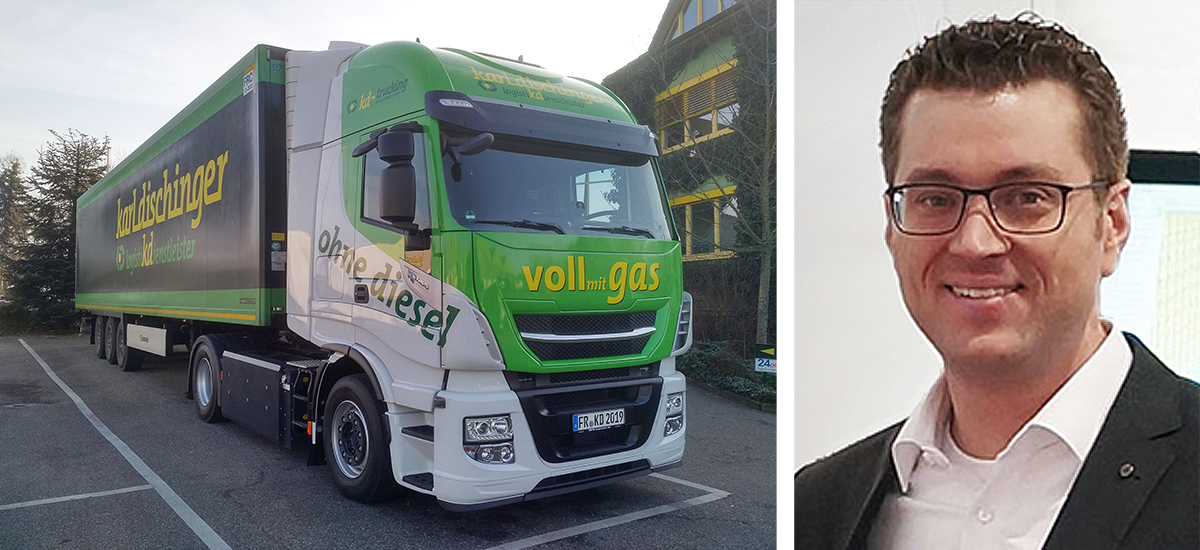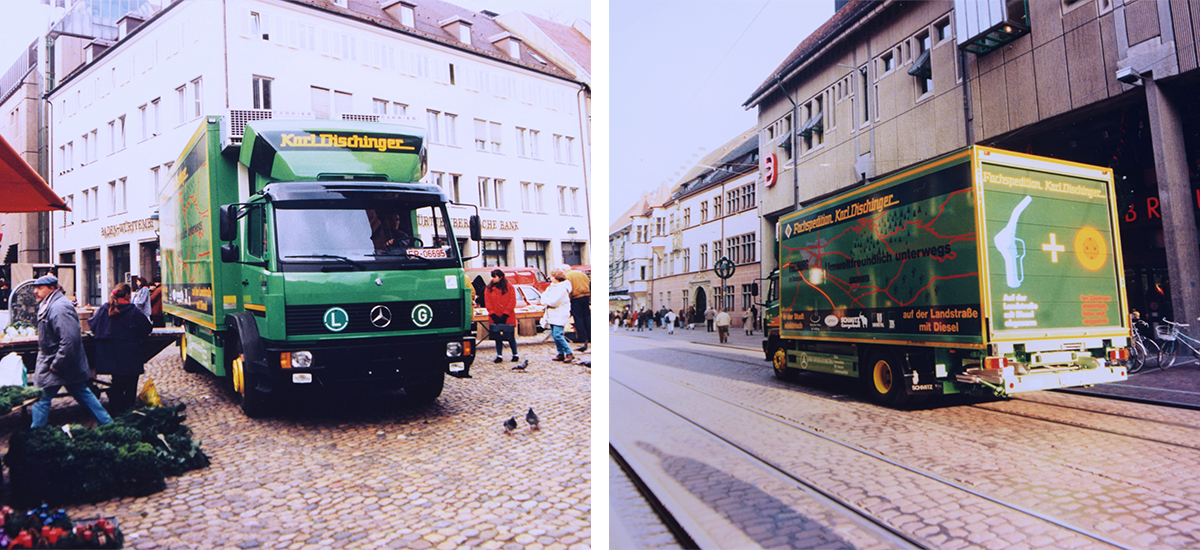The language of this website is controlled by the settings of your browser. You can select other languages via "Change"!
karldischinger group: Green by principle
Karlkristian Dischinger, Managing Director of the karldischinger group, has the intention to lead the family business completely towards CO2-neutrality in two to three years at the latest. In this interview, he explains the measures he and his family have been implementing for years to promote green strategies and how employees are being enthused about this topic.

Mr. Dischinger, your family can look back on a far-reaching tradition in transportation. When exactly were the foundations laid for the karldischinger group, which offers the entire spectrum from europe wide general cargo transports to full truck loads, as well as other comprehensive logistics services?
Karlkristian Dischinger: “That was really a while ago. The first documented transport order was carried out by my family in 1470. It was a wine transport from Rotweil am Kaiserstuhl, lying on a low mountain range in the Upper Rhine Valley to the monastery brothers of St. Blasien. The transport however, only took place once a year as a sideline. Nevertheless, the payment was still not bad. Our reward was a fiefdom.”
An exciting family story: from a fief farm owner with a sideline to a top logistics company. Your initial experience with electrically powered trucks, which your company gained as early as 1996, also proves that the karldischinger family business recognizes trends very early on and that you are not afraid to take on a pioneering role.
Karlkristian Dischinger: “Actually, we are rather “badisch” - reservedly calm. My father did use a hybrid truck powered by a diesel engine and an electric motor in city logistics /or/ distribution back in 1996, but we didn't make a big public issue of it. It was a 15-ton vehicle with a load capacity of only 2000 kg, because the batteries were simply too heavy at the time.”
... and probably the battery also did not convince with power performance ...
Karlkristian Dischinger: “... that's true. The range in electric mode wasn't practical, and it wasn't very efficient either. But my father had two solid reasons for using the vehicle over a longer period for deliveries within Freiburg: First to reduce the pollutant emissions and second to lower noise pollution for the resident. The truck was very quiet when operated in electric mode and we were therefore able to realize the transports within the city limits in the early morning hours and even at night.”
Sounds reasonable. But why were obstacles put in your father's way at the beginning of the hybrid truck project anyway?
Karlkristian Dischinger: “Literally stones. Since the streets in the city of Freiburg have been paved with beautiful cobblestones that could have been damaged by our heavy vehicle, we were not allowed to enter the city. My father had to make it clear that the garbage trucks used locally were heavier than our trucks. After that we finally were allowed to make deliveries within the city limits using the hybrid truck.”

Do you currently have e-trucks in your fleet?
Karlkristian Dischinger: “No. If so, then only in test mode. The costs are still too high, the range is not sufficient, and the availability of charging stations throughout Europe is currently not given. In our long-distance fleet, we only use EURO6 vehicles with state-of-the-art, environmentally friendly technology. We also operate several gas trucks in two-shifts. During the day, these vehicles are used in plant supply and disposal services or in production logistics and at night on selected routes. That way we can ensure that the gas trucks can refuel at our in-house gas filling station.”
Are gas-powered vehicles economically viable?
Karlkristian Dischinger: “Without the toll exemption? Not a chance. Even less due to the current exorbitant price increase. Whether we will use gas trucks in future is still an unanswered question for us.”
Understandably. After all, politicians only have a reasonably reliable framework for gas-powered trucks until 2023, although the EU Commission is even planning to classify investments in gas-fired power plants as climate-friendly under certain conditions.
Karlkristian Dischinger: “If gas-powered trucks will be classified as climate-friendly, that would significantly change the situation for us. Then the infrastructure, especially for the paradigm shift toward e-mobility, must be provided across the board, the e-trucks must be ready for series production, and the purchase price must be affordable. Then we will have the planning certainty desired by logistics companies for investments in a more climate-neutral fleet. But unfortunately, that is not yet the case now. For example, we had a purely electric yard shunting vehicle on test at our company. However, we had to stop the test after just half a day because the power grid in our business park did not provide enough energy to charge the vehicle. There were even severe fluctuations in the grid.”
Your European Food Network partner and almost neighbor Peter Galliker is already using hydrogen trucks in regular service in Switzerland. When will the first hydrogen truck leave your yard?
Karlkristian Dischinger: “For this, too, the infrastructure must be provided, the costs must be at an affordable range, and the vehicles must be ready for mass production. Daimler, for example, has not announced a pilot long-haul Actros with hydrogen drive until 2024. That's why it will unfortunately take some time before the first hydrogen truck is used in regular service in our country. But hydrogen still looms high on our agenda. In the future we will simply need a mix of hydrogen and electric mobility in order to achieve climate-neutrality on the road. My intention is to achieve this within all areas of the company. Protecting the environment sustainably is firmly anchored in the DNA of the karldischinger group.”
And to bring this principle to life, you have been implementing a range of measures for years. Can you point out the most important ones?
Karlkristian Dischinger: “When we talk about climate protection, it basically concerns the entire company. What's important for us is what we do: We've been equipping our roofs with solar panels and producing green electricity for around 20 years, our vehicle fleet has an average age of just over two years, and we therefore always use state of the art technologies in terms of pollutant emissions. We train our drivers to drive in a fuel-efficient manner, we buy green electricity, emphasize waste separation, and use LED lights with motion sensors wherever possible. But even more important for us is to spotlight the "why" and raise awareness among our employees: Why are we actually doing this? Why are we generally green? If our employees themselves have an intrinsic motivation to do something good for the environment, for their own children and for the next generations, then we are taking big steps in the right direction.”
A green path that you will not leave ...
Karlkristian Dischinger: “… you can bet on it. In 2020, we calculated how many metric tons of CO2 we emit within the entire company and determined the zero point in order to be able to make further targeted adjustments that will enable us to proceed even more efficiently. We are also in the process of drawing up a plan for achieving CO2 neutrality and thus compensate for all our CO2 emissions. I expect us to be CO2-neutral within the next 1-2 years.”
How can this be implemented?
Karlkristian Dischinger: “Currently, unfortunately, only through compensation. We buy emission certificates to compensate for our CO2 emissions, which we are not yet able to avoid on our own, and actively use this market-based instrument to reduce environmental pollution.”
A sensible investment ...
Karlkristian Dischinger: “… absolutely. We are already feeling the effects of global warming right on our doorstep. Soon, the wine grape variety Riesling will probably no longer grow in our region. Simply because the climatic conditions will no longer allow it. An almost unthinkable situation that the average citizen does not even really notice. We have been transporting wine since 1470 and currently we still have over 140 customers in this sector, but I am concerned that climate change may have drastic economic consequences for some of our clients in the wine and spirits industry.”
Thank you very much for the interesting interview.
Do you want to contact us?
European Food Network
Christian Auchter
Senior Expert Corporate Public Relations
Tel.: +49 831 59161426
Mail: christian.auchter@dachser.com
Thomas-Dachser-Str. 2
87439 Kempten
Germany
Link notice
You are now leaving the European Food Network website and will be automatically redirected to the website .
Do you agree?

